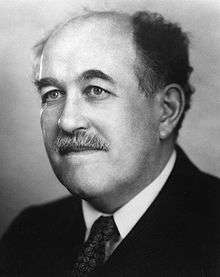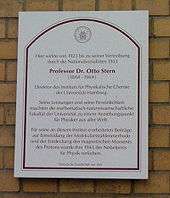Otto Stern
- Otto Stern was also the pen name of German women's rights activist Louise Otto-Peters (1819–1895).
| Otto Stern | |
|---|---|
 | |
| Born |
17 February 1888 Sohrau, Kingdom of Prussia (today Żory, Poland) |
| Died |
17 August 1969 (aged 81) Berkeley, California, United States |
| Nationality | Germany, United States |
| Alma mater |
University of Breslau University of Frankfurt |
| Known for |
Stern–Gerlach experiment Spin quantization Molecular beam Stern–Volmer relationship |
| Awards | Nobel Prize in Physics (1943) |
| Scientific career | |
| Fields | Physics |
| Institutions |
University of Rostock University of Hamburg Carnegie Institute of Technology University of California, Berkeley |
Otto Stern (17 February 1888 – 17 August 1969) was a German-American physicist and Nobel laureate in physics. He was the second most nominated person for a Nobel Prize with 82 nominations in the years 1925–1945 (most times nominated is Arnold Sommerfeld with 84 nominations), ultimately winning in 1943.
Biography

Stern was born into a Jewish family (father Oskar Stern and mother Eugenia née Rosenthal) in Sohrau (now Żory) in Upper Silesia, the German Empire's Kingdom of Prussia (now in Poland). He studied in Freiburg im Breisgau, Munich and Breslau, now Wrocław in Lower Silesia.
Stern completed his studies at the University of Breslau in 1912 with a doctoral dissertation in physical chemistry under supervision of Otto Sackur on the kinetic theory of osmotic pressure in concentrated solutions. He then followed Albert Einstein to Charles University in Prague and in 1913 to ETH Zurich. Stern served in World War I doing meteorological work on the Russian front while still continuing his studies and in 1915 received his Habilitation at the University of Frankfurt. In 1921 he became a professor at the University of Rostock which he left in 1923 to become director of the newly founded Institut für Physikalische Chemie at the University of Hamburg.
After resigning from his post at the University of Hamburg in 1933 because of the Nazis' Machtergreifung (seizure of power), he became professor of physics at the Carnegie Institute of Technology. During the 1930s, he was a visiting professor at the University of California, Berkeley.[1]
As an experimental physicist Stern contributed to the discovery of spin quantization in the Stern–Gerlach experiment with Walther Gerlach in February 1922 at the Physikalischer Verein in Frankfurt am Main;[2][3] demonstration of the wave nature of atoms and molecules; measurement of atomic magnetic moments; discovery of the proton's magnetic moment; and development of the molecular beam method which is utilized for the technique of molecular beam epitaxy.
He was awarded the 1943 Nobel Prize in Physics, the first to be awarded since 1939. He was the sole recipient in Physics that year, and the award citation omitted mention of the Stern–Gerlach experiment, as Gerlach had remained active in Nazi-led Germany.
After Stern retired from the Carnegie Institute of Technology, he moved to Berkeley, California. He was a regular visitor to the Physics colloquium at UC Berkeley. He died of a heart attack in Berkeley on 17 August 1969.[1]
The Stern-Gerlach-Medaille of the Deutsche Physikalische Gesellschaft awarded for excellence in experimental physics is named after him and Gerlach.
See also
References
- 1 2 "Otto Stern" (PDF). National Academy of Sciences. Retrieved 16 October 2017.
- ↑ Walther Gerlach & Otto Stern, "Das magnetische Moment des Silberatoms", Zeitschrift für Physik, V9, N1, pp. 353–355 (1922).
- ↑ Friedrich, Bretislav; Herschbach Dudley (December 2003). "Stern and Gerlach: How a Bad Cigar Helped Reorient Atomic Physics". Physics Today. Archived from the original on 29 September 2007. Retrieved 7 October 2007.
Sources
- Horst Schmidt-Böcking and Karin Reich: Otto Stern. Physiker Querdenker, Nobelpreisträger. Societäts-Verlag, Frankfurt am Main 2011, ISBN 978-3-942921-23-7.
- J.P. Toennies, H. Schmidt-Böcking, B. Friedrich3, and J.C.A. Lower (2011). Otto Stern (1888–1969): The founding father of experimental atomic physics. Annalen der Physik, 523, 1045–1070. arXiv:1109.4864
- National Academy of Sciences - Otto Stern (englisch; PDF; 1,0 MB)
External links
| Wikimedia Commons has media related to Otto Stern. |
| Wikiquote has quotations related to: Otto Stern |
